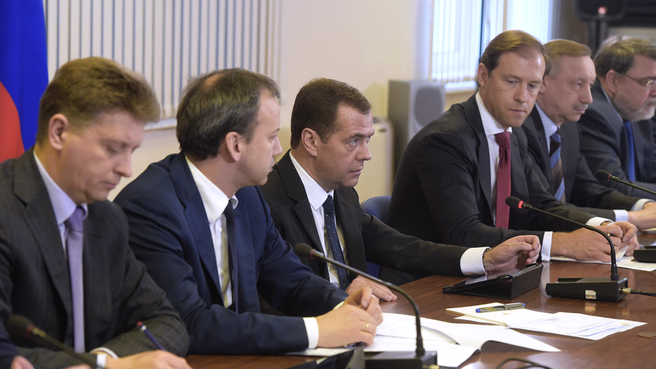A trip to the Tver Region.
From Dmitry Medvedev’s opening remarks:
A key objective in rail-transport engineering is the manufacturing of modern, innovative carriages and locomotives – safe, profitable and fast.
Transport engineering can become an economic growth point and support the labour market and general demand for goods at home and abroad. Factoring in the weakening rouble, this can also become a significant export incentive.
I have signed a Government directive approving a programme to support transport engineering in 2016. The programme contains a number of important provisions – first, a ban on the use of carriages with an extended lifespan and second, subsidies to investment projects to produce innovative freight cars. Third, we will reimburse operators new-carriage procurement costs. Up to 7 billion roubles have been earmarked for this purpose. The decision was taken to reduce VAT on passenger service on long-distance trains by 8 percent to 10 percent. Carriers, primarily the Federal Passenger Company, will spend the resulting funds on procuring new rolling stock.
It is essential to develop additional tariff stimulation measures to incentivise carriers and operators to buy new carriages. Upon my instructions, the service has already made a decision to this effect. We have provided a discount on empty mileage for innovative cars due to their lower infrastructure impact.
Like any industry, transport engineering reacts to the current economic situation.
Last year, the market for all types of rolling stock declined by 37 percent.
Nevertheless, we managed to avoid a deeper decline by building up exports (practically by two-thirds) and implementing an array of state support measures in 2015. These include subsidies to stimulate demand for innovative carriages (this measure helped provide contracts for companies and to build an additional 10,000 carriages). We also provided 1 billion and 1.5 billion roubles in subsidies for technological modernisation and for paying interest on working asset loans, respectively.
Another 60 billion roubles from the National Wealth Fund was invested in Russian Railways bonds. The funds were spent on procuring locomotives. I believe it is right to continue financing locomotive procurement with NWF funds this year as well.
About 1.4 billion roubles was provided to support the export of the high-tech goods of our train manufacturing plants. VEB financing of a contract to supply Uralvagonzavod cars to Azerbaijan was of key importance. More talks are underway. This week, I will sign off on the VEB Supervisory Council’s decision to grant three loans to support the export of passenger and freight cars – for Metrovagonmash to Hungary and for Uralvagonzavod to Iran and Kazakhstan.
Despite negative dynamics, our prompt response to the situation in the transport-engineering sector has prevented mass layoffs. Over 200,000 people are employed in the sector.
As last year, we will continue to subsidise train manufacturing and provide companies with large contacts and people with work.












